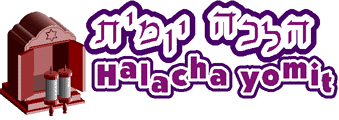|
|
|
Questions on this page

-
Question: If a Jew is forbidden
to speak lashon hara is he/she allowed to be a reporter? What if they are
supposed to mention bad things about other people?
Answer: The laws of lashon
hara certainly apply to reporters. They apply to everyone.
This does not mean the end of the reporting
profession, because there is still plenty that reporters can write. It
does mean that reporters have to be careful about what they write, and
as with any complex halachic issue, they should probably consult a competent
halachic authority on a regular basis. This issur is especially serious,
because it involves the livelihood (parnasah) and social standing of real
people.
There are instances in which one is
permitted to report things that another person does (for example to help
others avoid being scammed, or harmed etc). Yet, even in these instances
there are limitations: who may be notified (everyone, or only those who
may be harmed?), exactly what and how a person can relate the events and
more. These laws are complex, and would require a long explanation.
To further understand the subject I
would recommend that you read up on it. The most basic book available on
the laws of lashon hara is the sefer of the
Chofetz
Chaim, called: Sefer Chofetz Chaim (that's how the Chofetz Chaim became
known by this name). This book has been republished in recent years in
a halacha-a-day over the course of a year format. A few books summarizing
these laws have come out. One that I would recommend is: Guard your Tongue
(in English, in Hebrew it's called: N'tzor L'shoncha), written by Rabbi
Zelig Pliskin.
|
I also contacted Arutz-7,
a radio station here in Israel. One of the founders of this station is
a Rosh Yeshiva (dean of a Yeshiva), and I believe that they sincerely try to avoid
lashon hara. The following is the reply that I received from one of the
English news editors at Arutz-7 (a summary of the daily
news is sent out in English to e-mail subscribers daily and broadcast nightly). He was kind enough to share
some of of the dilemmas faced by jounalists who wish to avoid lashon hara.
"Shalom. Thanks for the question, which brings
up an issue that we always need to be reminded of. Rabbi Zalman Melamed
- the Rosh Yeshiva of Yeshivat Beit El, Rabbi of Beit El, and one of the
founders of Arutz-7 - is the rabbinic authority of Arutz-7. His guiding
principle is, first of all, that something that is already known (public
knowledge) can not always be publicized - as publicizing it further is
at least avak lashon hara (Avak lashon hara- a statement which is not lashon
hara itself, but will cause lashon hara to be spoken). However, one is
permitted to speak bad of someone if that will bring benefit to the public
or to many people, if this benefit cannot be effected in another way. For
instance, if a businessman presents himself as an honest man but is really
a crook, it is often mandatory to publicize this. Obviously, this principle
can be abused, and therefore requires the writer in a Torah publication
to be constantly on guard and to always remind and check himself regarding
the goals and the guidelines.
Equally obviously, the above rules out all sorts
of gossip columns, which have absolutely no place in a Torah publication.
Similarly, crime stories usually should not have any names mentioned. Even
political figures, who are often justifiably criticized based on the above
principle of "benefit to the public," should not be mentioned by name in
cases that can bring no such benefit - such as how many times he was divorced,
or the like. There have been several cases when we have specifically left
out names, even though in a "normal" newspaper they would have been mentioned
totally matter-of factly".
I think the bottom line is that it's important to
learn the details of hilchot lashon hara.
Return to top of
page l
View
questions on brachot (blessings) l
View questions
on tefilah- shmone esrei l
View questions on
tefilah- shmone esrei l
View questions on tevilat
keilim l
View questions on kashrut
|
|

|
|
In memory
of
Esther and Irving
Harris z"l
and
Esther and Tzvi
Lerner z"l
|
This site designed and implemented
by Tzvi Harris
© (1999) 5759- (2000) 5760 Halacha
Yomit for day schools
|

